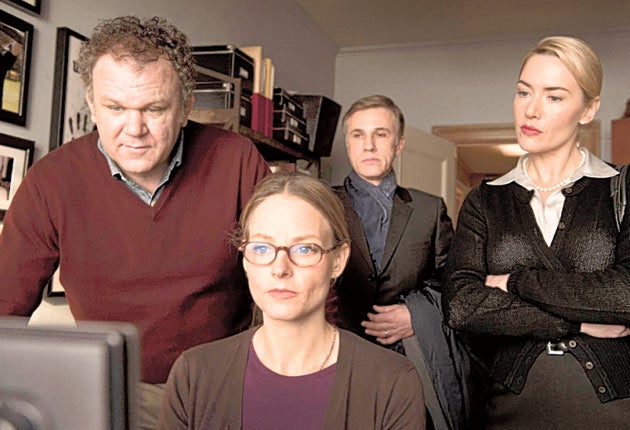Carnage, Venice Film Festival

Your support helps us to tell the story
From reproductive rights to climate change to Big Tech, The Independent is on the ground when the story is developing. Whether it's investigating the financials of Elon Musk's pro-Trump PAC or producing our latest documentary, 'The A Word', which shines a light on the American women fighting for reproductive rights, we know how important it is to parse out the facts from the messaging.
At such a critical moment in US history, we need reporters on the ground. Your donation allows us to keep sending journalists to speak to both sides of the story.
The Independent is trusted by Americans across the entire political spectrum. And unlike many other quality news outlets, we choose not to lock Americans out of our reporting and analysis with paywalls. We believe quality journalism should be available to everyone, paid for by those who can afford it.
Your support makes all the difference.Roman Polanski likes confined spaces. Knife in the Water, Cul-de-Sac, Repulsion and Rosemary's Baby all had a determinedly claustrophobic feel. So does Carnage (a world premiere in Venice.) The difference here is that this is a comedy, albeit a barbed and vicious one. Adapted from Yasmina Reza's play, it is a chamber piece, lasting barely 80 minutes. Thanks to the coruscating dialogue and four tremendous central performances, the film transcends its stage origins. Not since Richard Burton and Liz Taylor tore strips off each other in the movie version of Who's Afraid of Virginia Woolf? has there been a film that has probed so pitilessly into the lives of middle-class couples.
The action unfolds in "real time" in a New York apartment. Nancy (Kate Winslet) and Alan (Christoph Waltz) have turned up at the home of Penelope (Jodie Foster) and Michael (John C Reilly) to discuss a playground "bullying" incident involving their respective children.
Polanski delights in highlighting the contrast between what these parents say – and what they actually think. At first, they're scrupulously polite to one another. Each set of parents is apologetic about their offspring. Penelope and Michael solicitously serve their visitors apple cobbler. "We're all decent people," is their constant refrain. However, the tension and bad feeling is gradually rising. When Nancy suddenly vomits all over Penelope's cherished art books, their nervous truce ends.
As in old Buñuel films about dinner parties that never end, the characters have a morbid compulsion to remain in one another's company. They try to patch over their differences. Civility is briefly restored – and then the feuding begins again. As the film progresses, battle lines are blurred and the couples turn against each other too.
The actors (all likely to be in awards contention) are clearly enjoying themselves: Waltz is wonderfully sardonic as the lawyer more interested in taking calls on his mobile than sorting out his son's problems. Winslet is equally effective as a career woman with a weak stomach. Jodie Foster strikes just the right pitch of shrewish self-righteousness as the campaigner Penelope while John C Reilly's bonhomie masks his anger and cynicism.
Most of the humour here lies in the dialogue and the characterisation. Just occasionally, Polanski throws in some slapstick too, for example Winslet's projectile vomiting or a scene in which a BlackBerry is thrown into a bowl of tulips. As in so many sitcoms, action is largely confined to the living room. By the end of the film, this has become a virtual war zone.
Join our commenting forum
Join thought-provoking conversations, follow other Independent readers and see their replies
Comments